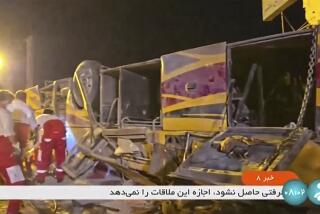150 Reportedly Killed in Stampede at Hajj
- Share via
MECCA, Saudi Arabia — Muslims rushing to fulfill a ritual known as “stoning the devil” set off a huge stampede Thursday that reportedly killed more than 150 people, many of them elderly, on the last day of the annual pilgrimage known as the hajj.
Some of the victims had sat down to rest on an elevated walkway in the 100-degree heat while waiting to begin the ritual. They were trampled from behind by fellow pilgrims when word came that the group could move forward. Others were knocked off the walkway and fell 17 feet to their deaths, witnesses said.
“If security forces had not intervened to stop the rush, thousands of pilgrims would have died,” a Mecca police official said on condition of anonymity.
A doctor who saw the stampede said that up to 600,000 pilgrims were waiting for police to open the walkway so they could cast their stones. Another doctor said an elderly Moroccan woman was trampled so heavily that her head was crushed.
Saudi officials said at least 30 pilgrims suffered injuries, including cuts and broken bones. Police and doctors said those killed were from Malaysia, Indonesia, India, Pakistan and the Mideast.
The stampede took place in the desert plain at Mina, about three miles from Mecca. To shield themselves from the sun, pilgrims had covered their heads with towels or carried umbrellas, some inscribed with the phrase “God is great.”
Ambulances rushed to the scene, and Saudi television showed soldiers carrying a body out on a stretcher. One soldier was trying to revive another person whose face was covered by an oxygen mask. Another offered water to an elderly man, who grabbed the bottle with a trembling hand.
Hundreds of pilgrims lined up outside Mina hospitals Thursday night, anxious to know the fate of their relatives.
Among them was Ziad Daher from Syria, who was looking for his brother Farouk. “I lost him in the crowd about 12 noon,” he said, tears in his eyes. “I haven’t seen him since.”
It was the latest tragedy to befall the hajj, which has been bloodied by other stampedes, fires and political protests that turned violent.
Saudi Arabia has invested millions to improve security for the increasing number of Muslims who make the pilgrimage. The hajj is required of all Muslims at least once in a lifetime if they can afford it, and about 2.3 million are in Mecca this year.
The pilgrims were preparing for a ritual known as “stoning the devil,” in which they hurl pebbles at three pillars symbolizing the temptations of Satan. Saudi officials say Asian Muslims tend not to believe in a symbolic throw and rush to get close enough for their pebbles to strike the pillars.
Saudi officials said on condition of anonymity that the death toll was more than 150. The official Saudi Press Agency said 107 died.
Last year, fires driven by high winds tore through a sprawling, overcrowded tent city at Mina, trapping and killing more than 340 pilgrims and injuring 1,500.
In 1994, 270 pilgrims, most of them Indonesians, were killed in a similar stampede during the ritual of the stoning of the devil.
In the hajj’s worst tragedy, 1,426 pilgrims, many of them Malaysians, Indonesians and Pakistanis, were killed in 1990 in a stampede in an overcrowded pedestrian tunnel leading to holy sites in Mecca.
The number of people making the hajj has multiplied many times over in recent decades, taxing facilities to the limit.
Before World War II, when most pilgrims still came by desert caravan, the number at the hajj was as few as 10,000. Buses and airplanes--as well as rising wealth in the Muslim world--have enabled millions to converge on Mecca for the pilgrimage.
The Saudis have sought to limit the crowds. Since 1987, they have enforced a quota that allows just 0.1% of each country’s Muslim population to make the hajj. Some Muslims complain that they must wait for years for permits.
Thousands of Saudi police are assigned to guard the pilgrimage routes, and scores of government volunteers move with the pilgrims to assist them.
Meanwhile, in Algeria, newspapers reported Thursday that nearly 100 civilians and Islamic fundamentalist rebels were slaughtered as the country celebrated the Muslim Feast of Sacrifice this week.
More than half of those killed were civilians, mostly women and children, in violence that mirrored past lethal surges at religious holiday times. The rebels say such events are propitious for what they term their “holy struggle.”
More to Read
Sign up for Essential California
The most important California stories and recommendations in your inbox every morning.
You may occasionally receive promotional content from the Los Angeles Times.










